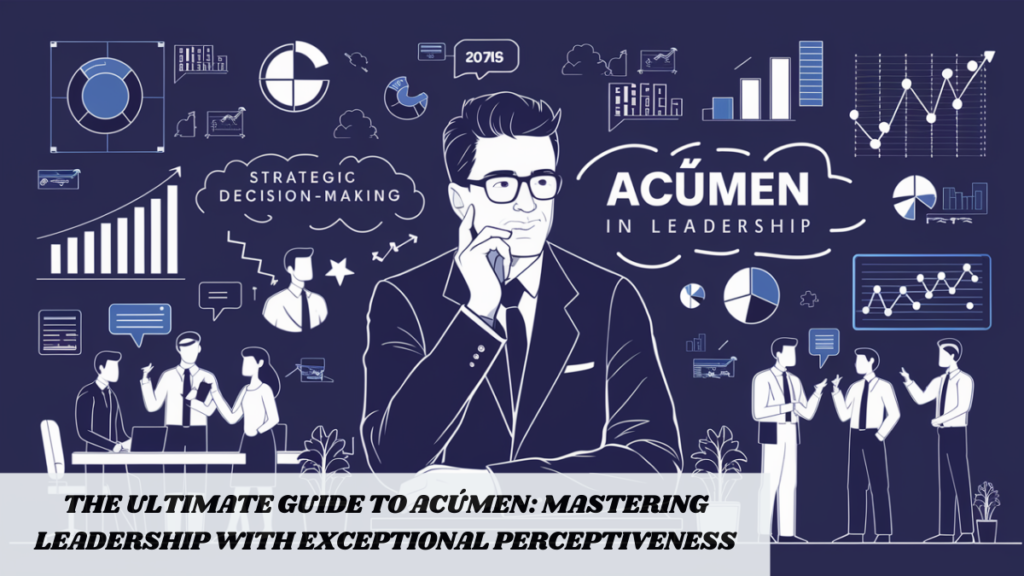The Ultimate Guide to Acúmen: Mastering Leadership with Exceptional Perceptiveness

Introduction
In today’s fast-paced world, the ability to lead effectively is more crucial than ever. Leaders are expected to navigate complex issues, make critical decisions, and inspire their teams toward shared goals. One quality that stands out in effective leaders is their acúmen. This term, which signifies exceptional perceptiveness and insight, is vital for understanding and managing multifaceted challenges.
Acúmen in leadership refers to exceptional perceptiveness that helps leaders understand complex issues, make informed decisions, and guide teams effectively. It’s crucial for strategic success and adaptability.
This comprehensive guide will delve into the concept of acúmen, its significance in leadership, and how you can develop and harness it to become a more effective leader.
What is Acúmen?
Defining Acúmen
Acúmen refers to the sharpness of mind and ability to understand and interpret complex issues from multiple perspectives. In leadership, acúmen involves an innate or developed ability to perceive underlying problems, predict outcomes, and make informed decisions.

It’s more than just intelligence; it’s about having a deep, nuanced understanding of various factors that influence outcomes.
The Role of Acúmen in Leadership
In leadership, acúmen enables leaders to:
- Analyze Complex Situations: See beyond the surface to grasp the root causes of issues.
- Make Strategic Decisions: Use insights to make decisions that align with long-term goals.
- Navigate Uncertainty: Adapt to changing circumstances with a clear understanding of potential impacts.
- Inspire and Guide Teams: Provide direction and motivation based on a comprehensive understanding of team dynamics and external factors.
The Importance of Acúmen in Leadership
Enhancing Decision-Making
Leaders with acúmen can make decisions that are not only informed but also strategic. They can anticipate potential challenges and opportunities, which helps in crafting effective strategies and avoiding pitfalls.
Improving Problem-Solving Skills
Acúmen helps leaders to identify and address problems more efficiently. By understanding the complexities of a situation, they can develop innovative solutions that might not be apparent to others.
Building Stronger Relationships
Leaders with acúmen can better understand the motivations and concerns of their team members. This empathy allows them to build stronger relationships and foster a more collaborative work environment.
Adapting to Change
In an ever-evolving business landscape, adaptability is key. Leaders with acúmen are more adept at recognizing and responding to changes, ensuring that their organizations remain competitive and resilient.
How to Develop Acúmen
Cultivate Self-Awareness
Understanding your own strengths, weaknesses, and biases is the first step in developing acúmen. Self-awareness allows you to approach situations with a clear perspective and avoid common pitfalls.
Seek Diverse Perspectives
Exposure to different viewpoints can enhance your perceptiveness. Engage with people from various backgrounds and industries to broaden your understanding and challenge your assumptions.
Analyze Past Experiences
Reflecting on past experiences, both successes and failures, can provide valuable insights. Analyze what worked, what didn’t, and why, to improve your future decision-making processes.
Stay Informed
Keeping up-to-date with industry trends, market developments, and global events can enhance your understanding of complex issues. Regularly read relevant books, articles, and reports to stay informed.
Practice Critical Thinking
Developing acúmen involves honing your critical thinking skills. Practice questioning assumptions, evaluating evidence, and considering alternative viewpoints to enhance your decision-making capabilities.
The Impact of Acúmen on Organizational Success

Strategic Planning
Organizations led by individuals with strong acúmen are better positioned to develop and implement effective strategic plans. These leaders can anticipate market trends, identify opportunities for growth, and align their strategies with organizational goals.
Risk Management
Acúmen enables leaders to assess risks more accurately and develop strategies to mitigate them. This proactive approach helps in safeguarding the organization against potential threats and ensuring long-term stability.
Employee Engagement
Leaders with acúmen are better equipped to engage and motivate their employees. By understanding the needs and aspirations of their team members, they can create a more positive and productive work environment.
Innovation
Organizations led by perceptive leaders are often more innovative. Acúmen helps in recognizing emerging trends and opportunities, fostering a culture of creativity and continuous improvement.
Case Studies of Leaders with Exceptional Acúmen
Example 1: Steve Jobs
Steve Jobs, co-founder of Apple Inc., is renowned for his exceptional acúmen. His ability to anticipate market trends and understand consumer needs led to groundbreaking innovations such as the iPhone and iPad.
Example 2: Elon Musk
Elon Musk, CEO of Tesla and SpaceX, exemplifies acúmen through his visionary approach to technology and space exploration. His perceptiveness in recognizing opportunities and navigating challenges has revolutionized multiple industries.
Example 3: Indra Nooyi
Indra Nooyi, former CEO of PepsiCo, demonstrated acúmen through her strategic vision and ability to manage complex global operations. Her leadership helped transform PepsiCo into a more health-conscious and sustainable company.
Challenges in Developing Acúmen
Overcoming Biases
Personal biases can cloud judgment and hinder the development of acúmen. Being aware of and addressing these biases is crucial for making objective decisions.
Managing Information Overload
In the age of information, it can be challenging to filter relevant data from noise. Developing acúmen involves distinguishing valuable insights from irrelevant information.
Balancing Confidence and Humility
Leaders must balance confidence in their decisions with humility to recognize when they need to seek additional input or adjust their approach.
Practical Tips for Enhancing Your Acúmen
Engage in Continuous Learning
Commit to lifelong learning to stay abreast of new developments and enhance your knowledge base.
Build a Network of Advisors
Surround yourself with knowledgeable advisors who can provide diverse perspectives and insights.
Embrace Challenges
Seek out challenging projects or roles that push you out of your comfort zone and expand your problem-solving skills.
Reflect Regularly
Take time to reflect on your experiences and decisions to gain insights and improve your acumen.
Conclusion
Acúmen is a critical quality for effective leadership, allowing individuals to navigate complex issues, make informed decisions, and drive organizational success. By cultivating acúmen through self-awareness, diverse perspectives, and continuous learning, you can enhance your leadership capabilities and make a significant impact in your organization.
FAQs
What is acúmen in leadership?
Acúmen in leadership refers to the exceptional perceptiveness that allows leaders to understand and navigate complex issues from multiple perspectives, leading to informed decision-making and strategic planning.
How can I develop acúmen?
To develop acúmen, focus on cultivating self-awareness, seeking diverse perspectives, analyzing past experiences, staying informed about industry trends, and practicing critical thinking.
Why is acúmen important in leadership?
Acúmen is important in leadership because it enhances decision-making, problem-solving, adaptability, and relationship-building, all of which contribute to organizational success and effective management.
Can acúmen be learned or is it innate?
While some individuals may have a natural inclination towards acúmen, it can also be developed through deliberate practice, learning, and experience.
How does acúmen impact organizational success?
Acúmen impacts organizational success by improving strategic planning, risk management, employee engagement, and innovation, leading to a more resilient and forward-thinking organization.




